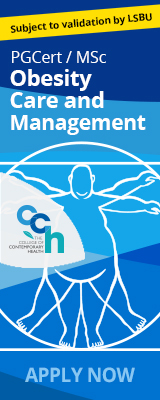Archive
Topic: NHS
The treatment of obesity: Past, present and future
Author: David Haslam
2015, Vol 1, No 1, Pages 4-5
Obesity has existed ever since civilisation has been recorded. The Venus of Hohle Fels, a crude statuette of a naked obese woman, is estimated to be 35000 years old - 10000 years older than her more famous cousin, the Venus of Willendorf. The recorded history of the treatment of obesity goes back thousands of years: in 500 bc, the ancient Indian surgeon Sushruta described "obesity, voracity, gloss of the body, increased soporific tendency and inclination for lounging in bed or on cushion" (Bhishagratna, 2006).
NOF news: The State of the Nation's Waistline 2015 report
Authors: Debbie Cook, David Haslam
2015, Vol 1, No 1, Page 7
Developed in response to the growing concerns about obesity, the National Obesity Forum's State of the Nation's Waistline 2015 report sets out a suite of recommendations that aim to help reduce the incidence of obesity and offer solutions for management of this disease, which is vital before this condition cripples an already ailing NHS.
The rewards and challenges of setting up a Tier 3 adult weight management service in primary care
Author: Carly Hughes
2015, Vol 1, No 1, Pages 25-31
The NHS Commissioning Board has recommended the introduction of medical, multidisciplinary, multicomponent weight management services (Tier 3 services) for obese patients requiring specialised management, including assessment for bariatric surgery. Unfortunately, these have not yet been commissioned in many areas. Barriers identified include obesity being a low commissioning priority, therapeutic nihilism, medical workload constraints, a lack of trained staff, financial barriers to developing new services, and challenges of evaluation. A particular challenge is the lack of long-term funding and the complex tendering processes used in some areas. However, patients value these services, and the sparse academic literature shows encouraging results. Nonetheless, more robust evaluation of these services, including additional outcome measures and longer follow-up after discharge, is required to demonstrate cost-effectiveness to the NHS.


